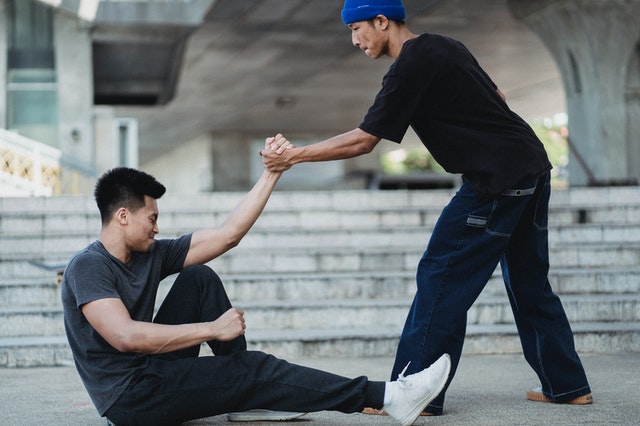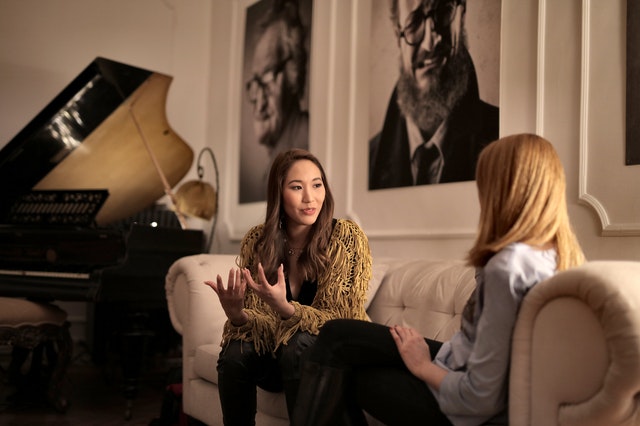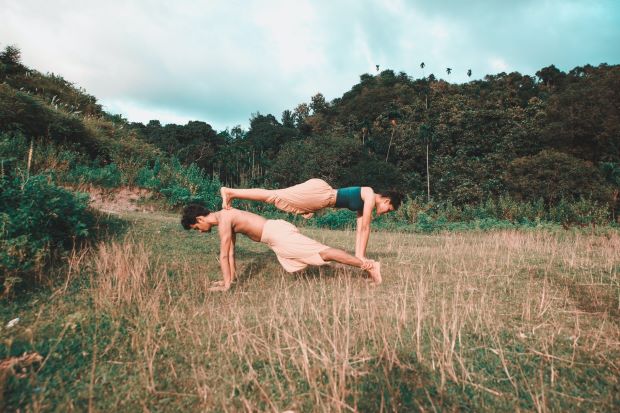- Chapter 1: Creating stronger bonds with your Partner
- Defense Mechanisms Demystified
- Changing Perspectives for Better Relationship Skills
- Chapter 2: Importance of Self-Love and Responsibility
- Chapter 3: Validation and Presence in a Relationship
- Chapter 4: Importance of Empathy and Vulnerability in a Relationship
- Chapter 5: Expectations and Communication in Relationships
Do you feel like you could improve the relationship you have with your partner, friend and others for a happier, healthier and more fulfilled life?
You’ve probably heard before that better relationship skills aren’t easy to maintain and they are a work in progress. But with a little mindfulness, you can learn simple and scientifically proven tricks to create, maintain—and even enhance—the bond you have with others, especially those who you love like your partner and friends.
You must also learn how to improve the most important relationship of all and the only one you must certainly improve because it is forever: the relationship with yourself.
It isn’t easy or intuitive to be more understanding and compassionate with yourself and others. You might have had a long day at the office that left you feeling quite drained but it’s not good enough to simply be your partner’s sounding board.
According to research from the University of California Santa Barbara feeling understood, validated, and cared for by someone else is proved to significantly improve your relationships and well-being. Those who actually care that their partner is stressed provide more support. Is this the partner you want to be and is this the partner you want to have?
You will also learn how to set time aside for yourself, to work in your own mind and eliminate the distractions that make it hard for you to focus on what is really important in your life and in your relationships. You will learn how to set time aside for intimacy and time aside to reflect.

Chapter 1: Creating stronger bonds with your Partner
Most relationship coaches and counsellors suggest that formal check-ins could strengthen the bond between people. Talk about everything, from household responsibilities to more intimate issues will help both parts feel more validated, respected, and comfortable.
The value of communication and how to be more pondered, how to communicate effectively, and what language to use in certain circumstances to have better, more productive conversations within the relationship are all things that can be learnt and practiced.
Many current issues in relationships could be prevented.
When we seek to avoid conflict we often end up crushed by it. However, if we learn how to pay attention and how to get into the habit of identifying issues even when they are small we are doing effective preventive care when it comes to out relationships.
Communication in relationships requires constant attention so it is vital to understand how to harness and practice our sustained attention to create stronger bonds.
Stronger bonds also depends on interiorizing certain gestures and attitudes, making them a part of our interactive routine with others. Gratitude is obviously in order when someone does a grand gesture, but what about the more mundane, like taking out the trash, giving you a ride to work, wash the dishes or pay a bill?
According to a study from the University of Georgia, giving thanks is a key ingredient to improving relationships and in this ultimate guide you will learn more about gratitude, appreciation and in how you can translate this into gestures.
Many books and articles have ben written about how to communicate effectively within relationships so it’s very common that we find it hard who to believe. Sometimes we hear something we perceive as an attack or criticism from our partner or friends, and we immediately rush to defend ourselves, activating our defense mechanisms.
These toxic patterns set both you and the other person involved in the conversation up not to be heard and as soon as you start to defend your position, you’ve already lost the chance to understand the other.
It is normal to feel under attack or think you hear a criticism, we are all insecure beings full of triggers and negative experiences, but you can learn how to understand your partner’s thoughts and feelings before you respond.
Defense Mechanisms Demystified
A lot of issues spiral out of control because once this vicious dynamic of criticism and defense sets, the interaction often moves fast. We jump to conclusions fast, create expectations fast, communicate fast and therefore miss a lot of important information that others are expressing.
This also increases the unpredictability of your conversations, making it harder for us to keep calm and reasonable when things get complicated or ugly. Good news is that we can actually learn how to intentionally slow down the exchange, making sure that others know that we truly want to understand what they are saying.
People will know you truly because you will learn how to strip out of fear and show yourself, how you really are for the sake of a healthier life and healthier relationships.
When we learn what our emotional triggers are, it allows us to be aware when they are about to activate and the same works for other people. We all bring ‘baggage’ into our relationships, baggage from our childhood, previous relationships, school, and work experiences and of course, our family.
Nobody is ‘baggage-free;’ but you learn how to use your awareness of your and others’ hot spots to know when they are likely to be triggered and avoid or mitigate conflict. This understanding will help both parts of the relationship to be less reactive in the moment which will save you a lot of trouble and free more time for the good and fun things!
It is important to be and remain curious, and seek to learn new things about your partner. This will make you overcome your defense mechanisms, support your conversation and interactions in moving toward a resolution.
We can still disagree with other people’s perspective and remain curious and interested in how their view is different from our own. Being curious about your partner or friend’s perspective can be quite disarming in a positive way, and it help you de-escalate the rising tension that threatens the moment or the entire foundation of your relationship.

Changing Perspectives for Better Relationship Skills
Learning and practicing how to empathize and relate to others is an extremely important tool when it comes to personal relationships. By imagining yourself walking in someone else’s shoes, seeing the world from their perspective, you will create a deeper bond and a strong sense of safety and trust between you and the other person.
I know this is the last thing you feel like doing in some extreme circumstances, for example when you feel attacked or misunderstood and neglected and your defense mechanisms are strongly activated.
Empathy does require you to be able to step outside yourself and begin to appreciate a reality different from yours but the results are so outrageously positive that it will be worth taking your time to practice this skill!
Practicing empathy does not mean that you have to completely surrender and give up what you want or give up your own reality. You must also know how and when to stand up for yourself and how to deeply respect and care for your own perspective, your own needs and your own desires – and how to communicate them.
A healthy relationship can only happen when nobody is taking advantage of your kindness and generosity. You will learn in this Guide how to protect yourself and set boundaries when and if necessary.
People aren’t mind readers, not even the ones who are so close to us and know us so well. If we need something, we need to ask for it. People won’t guess that we need help, affection, attention, etc. unless we make the request.
A good partner or friend will try to deliver so we you will learn how to be that partner or friend and demand our partner and friends to do so as well.
It is tricky to keep bouncing from one perspective to another without falling into the traps of being either too self-centered or too understanding to the point you question the validation of your own opinions and thoughts. But with practice and patience, we can get there.
If you don’t take some action, then whatever the issue is will only get bigger and harder to heal. Relationships are complicated but they are supposed to add something positive to our life, to make us grow and learn in relation to others.
Relationships are not supposed to be a source of stress and pain. There are of course relationships impossible to fix and you shouldn’t be going through all these efforts for someone who doesn’t deserve your affection and dedication.
But if you decide consciously that they do and that you want to improve your relationships for the sake of your own well-being, this will be a very helpful guide to achieve your goal. If you do feel like you could improve the relationship you have with yourself and with others for a happier, healthier and more fulfilled life, continue reading.
Relationships do take work and they are a journey full of twists and turns but it is within your reach to have more control over the path of your relationship and create a better story.

Chapter 2: Importance of Self-Love and Responsibility
Consciously getting into a relationship can be a pretty serious deal and it is normal to feel as scared as we feel excited.
Perhaps you are longing for that deep connection with another person, feel ready for a committed relationship and already updated your Tinder Profile or asked your friends if they know any potentially interested candidates.
Perhaps you have been toying with the idea of taking your casual relationship to the next level and are wondering if you are ready at all.
Perhaps you are just going through some thoughts about a current relationship you already have – a friendship, a relationship with a family member or someone you work with.
The idea of responsibility – ugh, the word! – can quickly cancel the thrill of your fantasies with strangers, the magic of another great date or even a trip with your best friend.
Responsibility is an inevitable part of life that should be considered before making any decision that involves the well-being and emotional safety of others and our own. But it is also a small price to pay for the wonders of a healthy, loving and fulfilling relationship.
The good news is that in a healthy relationship, responsibility is shared and most times, you will either not even feel its weight at all or you will be happy to carry it because it empowers you, it gives you confidence.
It is scary when we sudden receive a new load of responsibility – when our parents trust us with the house for the first time on our own, when we have to learn how to manage our own finances for the first time or are given a new task at work.
But doesn’t it also feel awesome that people trust us? Doesn’t it make us feel competent?
Responsibility is one of the best tools to learn, grow and improve and a relationship – be it romantic or not – is a fantastic opportunity to grow and improve in relation to someone we deeply care about.
To be able to be responsible about others, we need to learn how to be responsible about ourselves in the first place. We need to somehow give proof that we deserve such trust and opportunity.
We must not only show but be ready. The following sentence surely is a cliché but like any good story tropes, clichés pass the test of time for a reason: To be able to love others, you must love yourself first.
And loving yourself doesn’t only mean recognizing your qualities and what makes you lovable. It means knowing yourself with your flaws as well. It means finding happiness within yourself and recognizing that other people – the people you want to be or are in a relationship with – do not control your happiness.
In one of his most famous works, Hamlet, William Shakespeare wrote “There is nothing either good or bad but thinking makes it so.” We will get into the issue of overthinking later in this Guide, but for now it is important to dwell on this idea for a bit.
Our interpretation of events is ultimately what makes things good or bad and while the actions of the people we love will naturally bring us joy or sadness, these are only moments, not a lasting state.
Happiness is something else and when it comes to relationships, you must be ready to accept, no matter how hard it can be at times, that it depends mostly on you and your view of the world. The relationship you have with yourself is the only one you can know for sure that will last until your last day so you need to make it a healthy one.
Only be having a healthy relationship with yourself and stopping from time to time to make self-assessments and talk to yourself about it, you can be ready to sustain healthy relationships with others.
Take away Thoughts
How are you feeling about your relationship with yourself today? Is there anything that you are unhappy about and want to fix? What about things you’re grateful for? I would like to suggest that you take some quality time today to spend with yourself, assess and nurture that relationship.

Chapter 3: Validation and Presence in a Relationship
We often associate validation as a something negative about someone’s character. Validation can be perceived as an excessive need of approval or even a wrong entitlement to such approval and acceptance. While this is true for some cases, validation is an extremely important way of really connecting to other people like your partner and friends. Validation is a superpower!
It is the act of helping someone feel heard and understood and it has the power to reconcile fears and concerns. It has the power to add a boost to excitement, avoid or quickly resolve arguments, make people much more open to your advice, and much more.
Genuine validation turns what we are feeling relevant, it makes us feel that our feelings and the reasons for it are true and respected.
Exercising effective validation is not easy and it comes in two stages. The first one is to identify the specific emotion/feeling and the second is to offer justification for that feeling or emotion.
If your partner expresses his or her frustration about a particular incident, you might feel the impulse to offer a solution or even to dismiss it with good intentions to minimize stress but that is not as effective as starting by validating what the person is saying or feeling with a simple “Oh no, that is so frustrating, it would drive me crazy!”. Something like this shows that you identify the emotion (frustration) and justifies it (you would feel the same).
Things like “It’s not that big a deal!” “You’ll be fine!” “I expected you to do well” or “It could be worse!” don’t necessarily mean that you don’t care and are consciously dismissing the problem.
They can carry a positive intention to spare your partner or friend from stress and put things into perspective or you genuinely thought they would succeed and aren’t surprised. The same goes for jumping into offering solutions for the problem, you are probably really interested in helping and solving.
But when someone is feeling emotional, upset, stressed or just very excited and that is the first reaction to them expressing their feelings, they will feel dismissed. Things like “Ah, that is so sad…”, “I would feel very angry too!” or “You should be excited, this is a great accomplishment!” are much better reactions and they validate the other person’s feelings.
I still have small unnecessary fights with my partner following lack of validation and I know that he means well when he promptly offers solutions or tells me “everything is relative and I will feel better tomorrow.” when I am upset over something. It takes practice and consistency to validate genuinely but we must begin today!
Another aspect that fall into the category of active engagement with our partner is presence. Validation, acknowledging them and their feelings, often depends a lot on showing that you are giving your undivided attention to them and their feelings by being present.
Being present doesn’t mean just being physically present. This is not always possible and that doesn’t mean you cannot be fully there. Being present is having your mind focused and ignoring everything else, making the effort to really concentrate on your partner or friend and what they are telling you.
And if this is not possible in the moment they need us, we just have to be honest and promise they will get our undivided attention when we finish this or that task. Look them in the eyes as they speak to you, show that you are paying attention.
Remember that a lot of the apparent sacrifices we must do for others are things that we actually expect from them. We expect the people we care about and who care about us to validate our feelings and to be present for us, even if we never ‘labelled’ these things.
Take away Thoughts
I would like to invite you to remember times you felt sad or neglected for not being validated and times you felt frustrated for not being paid fully attention in a conversation with your partner or friend. Then remember times you might have done the same for them, even with the best intentions. Practice validation and reflect about presence so next time you will do much better!

Chapter 4: Importance of Empathy and Vulnerability in a Relationship
Empathy, the ability to visualize us walking in someone else’s shoes, it’s easier said than done. We hold an inherent tendency to stick to our point of view, the one that is familiar, and that is a very well coded coping mechanism.
It’s hard to go against it because our brains are designed to make us survive and not necessarily to make us happy. Being able to relate to others is an important socializing tool and a vital skill when living in a community but in a modern society we are also continually stimulated to be individualists for our own survival.
This is confusing! Empathizing and relating to others is very difficult when they are different from us but it is the key to success in healthy relationships!
A lot of problems in relationships arise because we are different people, with different backgrounds, different personalities, different genders, different concerns, different perspectives, and different ways of dealing with life.
And when we are confronted with this difference, we tend to think that we are right – because we have survived so far using our own perspective! – and the other is wrong.
But many times, the solution is not to find out who is right and who is wrong, it’s just about finding the balance by empathizing with our partner or friend. It’s about finding that sweet spot where we can say “I understand you” even if we don’t completely agree with what the person is saying or his/her reaction to an event.
How do we learn empathy?
We practice it. We exercise putting ourselves into our partner or friend’s perspective. They might seem like they are overreacting to something that happened at work or something that we or someone else said or done. But why do they feel like that? Is there anything else disturbing them? Are they tired, hungry, ill? Does it trigger any unpleasant memory?
If we can find out why our partner or friend is acting this way or why they are the way they are, we will be more likely to understand and justify the differences. Look at them. Imagine them as a child. Imagine them going through their day. Try to live their life in your mind as an actor lives a character.
The capacity to genuinely empathize and care about our partner’s issues and life in general by putting ourselves in their shoes and allow them to trust us, depends a lot on the capacity to be ourselves and trust them to put themselves in our shoes as well.
This is where vulnerability makes its entrance. Like many of the concepts discussed in these lessons, vulnerability also often has a negative connotation. Being vulnerable can be perceived as being weak, frail or defenseless.
These don’t sound like very attractive qualities, do they? But being vulnerable is actually the opposite of being weak, because one has to be confident and strong to allow yourself to put down your walls in front of someone else.
When you are vulnerable, you allow all the things that ‘decorate’ you as a person to disappear and you are unapologetically you, with all your flaws, fears and insecurities. And this is very attractive to the ones who love you because they can see that they too can be vulnerable in front of you.
Vulnerability is Trust. And trust is one of the most important things in a healthy relationship.
Take away Thoughts
Go on and practice these two concepts in your relationships. Have fun imagining that you are your partner or friend to exercise empathy and have the courage to strip down from all the layers that protect you from other people’s judgment to present yourself vulnerable to your partner, trusting them to love you for who you really are.

Chapter 5: Expectations and Communication in Relationships
Oh, Expectations… this thing that can ruin relationships before they even begin! We didn’t bring Expectations and Communication together for this chapter randomly.
Expectations depend a lot on the communication we have with our partners and with ourselves. But there is an especially tricky balance to find when it comes to talking to ourselves within our own perspective.
Expectations are a manifestation of our desire. We project in our relationships with others what we want them to be and even though this isn’t done with malice and sometimes it’s even done without intent, it isn’t always fair.
We are not responsible to match other people’s expectations of us and the same must work for our partner or friend. In a lot of occasions when we feel frustrated and dissatisfied with our relationship, it’s because we expected something different from what we are getting.
When I started dating my current partner, our expectations towards each other were very different. I have been single for a long time and felt ready for a relationship, while my partner had just been through a very hard break-up and was not yet interested in a serious commitment.
We stuck to our own expectations and ended up suffering a lot in the process and even though we are happy now, it was a lot of unnecessary drama. But we did learn a lot.
How to get rid of expectations that make us unhappy in our relationship?
First of all, we really have to listen and pay attention. People tell us and show us who they are and what they want all the time but we are often distracted – or in denial – because of the ideas we already conceived about them and the relationship we want – our expectations.
Second, we must frequently stop to access our expectations whenever we are feeling frustrated in the relationship and understand if they are the cause for our dissatisfaction.
Remember what you learned in second chapter, you are responsible for your own happiness and you cannot expect your partner, friend or anyone else in the world to fulfil all of your needs, wishes and whims. If you are still doubtful, I suggest you consult a friend and get an outside opinion and point of view because a friend is not biased about your relationship like you are.
However, the best way is always to communicate the relationship issue with your partner or friend. That is the only way you can be absolutely sure of what is going on and to solve it as a team. If you want to learn how to master the art of conversation, take a look at this guide.
If you are serious about mastering your conversational skills, you can Enroll in our Free online course that teaches you how exactly to master communication in any circumstances.
Of course, this is scary sometimes. We are afraid to be wrong or that we will come across as pushy and then we will upset the person we love. Or worse, they won’t want to be with us anymore because we are weird and problematic and they want someone who doesn’t bother them with questions of reassurance. If that was the case, would you want to be in a relationship with such person?
Relationships take work and have lots of uncomfortable moments. You will be surprised with how much your partner of friend understands your doubts and failed expectations, because we all have them and they certainly had them too.
Take away Thoughts
Be open to conversation and kindly let your partner or friend know they can also communicate any issue with you and if they expect something from you that you are not delivering, they should let you know.
Congratulations, you have reached the End of Part 1 of this Ultimate Guide: Better Relationship Skills in 10 Steps.
In Part 2 of this Guide we delve deeper into the essential relationship skills required for a happy and satisfying social life.





2 Comments
Thanks for the good article, I hope you continue to work as well.
I really enjoyed this content, I have decided to take one of the courses available here